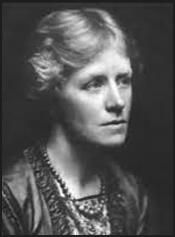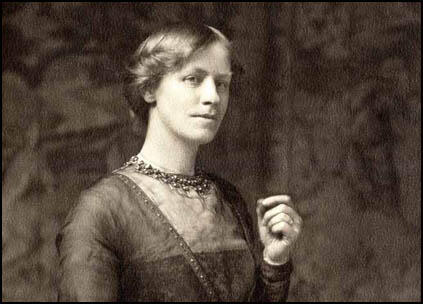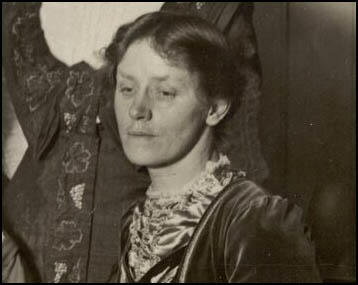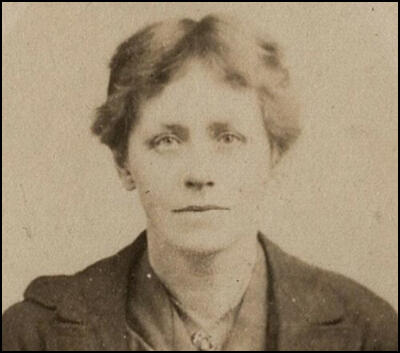Helena Swanwick

Helena Swanwick, the daughter of the artist, Oswald Sickert, was born in 1864. Her mother, Eleanor Louisa Moravia Henry (1830–1922), was the illegitimate daughter of a professional dancer and a fellow of Trinity College. She had three brothers, of whom the eldest was Walter Sickert.
In 1868 the Sickerts moved to England and settled first in Bedford, and then in Notting Hill, where they became friends with William Morris, Johnson Forbes Robertson and Edward Burne-Jones.
At fourteen Helena went to Notting Hill High School. While at school she read, The Subjection of Women by John Stuart Mill. Deeply influenced by Mill's ideas, she rebelled against her parent's views on the role of women. She complained about the way she was treated by her mother. "A boy might be a person but not a girl. This was the ineradicable root of our differences. All my brothers had rights as persons; not I. Till I married (at the age of twenty four), she never, in her heart, conceded one personal right."
In 1882 Helena's father refused to pay the fees for her to attend Girton College. However, she had a sympathetic godmother who agreed to finance her studies. Her tutors included Henry Sidgwick, Alfred Marshall, and John Neville Keynes. She gained second-class honours and in 1885 she was appointed lecturer in psychology at Westfield College.
While at the University of Cambridge she met Frederick Tertius Swanwick, a lecturer in mathematics at Owens College . Although there was a thirteen years age difference, the couple married in 1888 and set up home in Manchester. There were no children of the marriage. Helena Swanwick became a close friend of C. P. Scott and his wife, Rachel Scott, over the next few years wrote articles and reviewed books for the Manchester Guardian.

Swanwick also did voluntary work in a girls' club, which brought her into contact with the Women's Trade Union League, the Women's Co-operative Guild, and the Independent Labour Party. During this period she met Emmeline Pankhurst and her daughters. In 1905 she joined the North of England Suffrage Society, which was affiliated to the National Union of Women's Suffrage Societies. Soon afterwards she read about how Christabel Pankhurst and Annie Kenney defied "the Liberal Stewards at Sir Edward Grey's meeting". She wrote that "my heart rose in support of their revolt. I sent them a subscription and, if I had not, for the moment, been suffering from an attack of influenza, I think I should have rushed into Manchester and enrolled myself with them. I am glad that this did not happen, for I should very soon have discovered differences so fundamental as to require me to break away again!"
in 1908 she "addressed one hundred and fifty meetings all over England and Scotland with an average attendance of six hundred persons." The following year she became editor of the NUWSS's weekly journal, The Common Cause. As a pacifist, Swanwick was a strong opponent of the Women's Social & Political Union. She also disapproved of what she believed was the anti-male stance taken by its leading members, Emmeline Pankhurst and Christabel Pankhurst.
When in 1912 Millicent Fawcett tried to persuade Swanwick to be less critical of the Women's Social & Political Union, she resigned her post as editor of The Common Cause. The following year she wrote a book where she was able to express her own views on the best way to achieve universal suffrage, The Future of the Women's Movement (1913).
In July 1914 the NUWSS argued that Asquith's government should do everything possible to avoid a European war. Two days after the British government declared war on Germany on 4th August 1914, Millicent Fawcett declared that it was suspending all political activity until the conflict was over. Although the NUWSS supported the war effort, it did not follow the WSPU strategy of becoming involved in persuading young men to join the armed forces.

Despite pressure from members of the NUWSS, Fawcett refused to argue against the First World War. Her biographer, Ray Strachey, argued: "She stood like a rock in their path, opposing herself with all the great weight of her personal popularity and prestige to their use of the machinery and name of the union." Swanwick resigned from the NUWSS over its policy on the war.
The day after war was declared, Charles Trevelyan, a member of Asquith's government who had resigned over this issue, began contacting friends about a new political organisation he intended to form to oppose the conflict. This included two pacifist members of the Liberal Party, Norman Angell and E. D. Morel, and Ramsay MacDonald, the leader of the Labour Party. A meeting was held and after considering names such as the Peoples' Emancipation Committee and the Peoples' Freedom League, they selected the Union of Democratic Control (UDC).
The founders of the UDC produced a manifesto and invited people to support it. Over the next few weeks several leading figures joined the organisation. This included Helena Swanwick, Mary Sheepshanks, J. A. Hobson, Charles Buxton, Frederick Pethick-Lawrence, Arnold Rowntree, Morgan Philips Price, George Cadbury, Fred Jowett, Tom Johnston, Philip Snowden, Ethel Snowden, David Kirkwood, William Anderson, Isabella Ford, H. H. Brailsford, Israel Zangwill, Bertrand Russell, Margaret Llewelyn Davies, Konni Zilliacus, Margaret Sackville and Olive Schreiner.
In January 1915 Mary Sheepshanks published an open Christmas letter to the women of Germany and Austria, signed by 100 British women pacifists. The signatories included Helena Swanwick, Emily Hobhouse, Margaret Bondfield, Maude Royden, Sylvia Pankhurst, Anne Cobden Sanderson, Eva Gore-Booth, Margaret Llewelyn Davies and Marion Phillips. It included the following: "Do not let us forget our very anguish unites us, that we are passing together through the same experiences of pain and grief. We pray you to believe that come what may we hold to our faith in peace and goodwill between nations."
At a Council meeting of the National Union of Women's Suffrage Societies held in February 1915, Millicent Fawcett attacked the peace efforts of people like Mary Sheepshanks. Fawcett argued that until the German armies had been driven out of France and Belgium: "I believe it is akin to treason to talk of peace." After a stormy executive meeting in Buxton all the officers of the NUWSS (except the Treasurer) and ten members of the National Executive resigned. This included Chrystal Macmillan, Kathleen Courtney, Catherine Marshall, Eleanor Rathbone and Maude Royden, the editor of the The Common Cause.

In April 1915, Aletta Jacobs, a suffragist in Holland, invited suffrage members all over the world to an International Congress of Women in the Hague. Some of the women who attended included Mary Sheepshanks, Jane Addams, Alice Hamilton, Grace Abbott, Emily Bach, Lida Gustava Heymann, Emmeline Pethick-Lawrence, Emily Hobhouse, Chrystal Macmillan, Rosika Schwimmer. At the conference the women formed the Women's International League for Peace and Freedom. Helena Swanwick was banned by the government for attending the conference but she soon joined the organisation and later that year became its chairman.
Her biographer, Jose Harris, has argued: "From 1915 to 1922 she was chairman of the Women's International League for Peace, which aimed to harness feminism to the peace movement; and throughout the First World War she campaigned for a negotiated peace and the establishment of an international peace-keeping organization. She was highly critical, however, of the terms under which the League of Nations was set up in 1919, partly because the league was permitted the use of force and economic sanctions, and partly because it was committed to supporting the Versailles settlement, which she regarded from the start as an unjust and unstable peace."
In 1924 Swanwick became editor of Foreign Affairs, the journal of the Union of Democratic Control. She also wrote for the feminist journal, Time and Tide. She continued to campaign for an improvement in women's rights. In November 1927 she wrote: "The earlier struggles of women for emancipation necessarily take the form of beating at the closed doors of life. Till these are opened and we can see for ourselves what there is of knowledge and opportunity we cannot know how much we can put to good use. Many of these doors are still closed, but far more have been opened even in my lifetime than, as a girl, I should have ventured to hope. Our immediate and difficult task is to test all and reject what is not for us; to modify much and adapt it to our needs and natures. It is a commonplace to say that women are born into a world still largely man-made, it is their business to modify it till it becomes a human world as fit for full-sized women to live in as for full-sized men. It is my conviction that most men have not a notion how immensely better the world could be made for them, by the full co-operation of women. But that's another story."
Swanwick was active in the League of Nations Union and was a member of the British Empire delegation to the League of Nations in 1929. Swanwick wrote several books including an autobiography, I Have Been Young (1935).
Helena Swanwick, depressed by poor health and the growth of fascism in Europe, committed suicide on 16th November 1939 at her home in Maidenhead, after the outbreak of the Second World War.
Primary Sources
(1) In her autobiography, I Have Been Young, Helena Swanwick complained about her mother going through her private papers.
I was angry at what I held to be a violation of my privacy and I exclaimed "You forget I'm a person!" I remember this because my mother thought it so funny, and for long after she mocked me saying "I forgot! You're a Person!" A boy might be a person but not a girl. This was the ineradicable root of our differences. All my brothers had rights as persons; not I. Till I married (at the age of twenty four), she never, in her heart, conceded one personal right. Once I had a husband her whole attitude towards me changed and just as formerly I could do nothing right, so latterly, I could do nothing wrong in her eyes.
(2) Helena Swanwick, I Have Been Young (1935)
When I read in the paper of the action of Christabel Pankhurst and Annie Kenney in defying the Liberal Stewards at Sir Edward Grey's meeting in 1905 my heart rose in support of their revolt. I sent them a subscription and, if I had not, for the moment, been suffering from an attack of influenza, I think I should have rushed into Manchester and enrolled myself with them. I am glad that this did not happen, for I should very soon have discovered differences so fundamental as to require me to break away again!
(3) Helena Swanwick worked for the Women's International League during the First World War.
Sex before marriage was the natural female complement to the male frenzy of killing. If millions of men were to be killed in early manhood, or even boyhood, it behoved every young woman to secure a mate and replenish the population while there was yet time.
(4) Helena Swanwick, Builders of Peace (1924)
When mobs, assiduously working up by a few papers or a few persons, broke up meetings or assaulted speakers, no protection was to be had, and the tone taken by the authorities was it "served them rights". Members of the UDC were shadowed by the police, raids were made on offices and private houses, and in many cases publications passed by the Censor were seized and impounded, and people who were engaged in selling them were taken up, threatened and intimidated.
(5) Helena Swanwick, Time and Tide (4th November 1927)
The earlier struggles of women for emancipation necessarily take the form of beating at the closed doors of life. Till these are opened and we can see for ourselves what there is of knowledge and opportunity we cannot know how much we can put to good use. Many of these doors are still closed, but far more have been opened even in my lifetime than, as a girl, I should have ventured to hope. Our immediate and difficult task is to test all and reject what is not for us; to modify much and adapt it to our needs and natures. It is a commonplace to say that women are born into a world still largely man-made, it is their business to modify it till it becomes a human world as fit for full-sized women to live in as for full-sized men. It is my conviction that most men have not a notion how immensely better the world could be made for them, by the full co-operation of women. But that's another story.
The welfare and the wealth of a society depend upon the full functioning of all the beneficent and productive activities of all its members. The health and happiness, the mental growth and development of all these members depend upon their full functioning. Therefore all theories of the State, or of government, or of family organization which require the limitation or restriction of such functioning are sterilizing theories; all conditions of society which make such limitation or restriction inevitable, are diseased conditions and intelligent people will not sit down content with the disease and its resultant restrictions, but will set about removing the disease and the restrictions with it. Sometimes the removal of the restrictions actually precedes and encourages the removal of the disease.
(6) Helena Swanwick, Time and Tide (11th November 1927)
It takes a very patient and understanding sort of woman not to go off the deep end when she hears men talk of 'the unfair competition of women.' Because women carry a pretty heavy handicap; because the conditions of their lives in the past have made their organisation very difficult and they have therefore been more docile in the hands of employers; because their work is apt to be more intermittent (owing to domestic claims) and more unskilled (owing to lack of training); because they have schooled themselves, through necessity, to wait on themselves and spend less on themselves than their male fellow-workers do these fellow-workers complain of their 'unfair competition' and have made persistent efforts, which are by no means ended to exclude women from any work which is attractive enough for men to desire it. This is the real sex war and, like all war it is immensely wasteful of life, it creates an immense amount of ill-feeling and it does not arrive at the desired results.
Women must work because they need the work and the independence resulting from it and because the community needs it. Women should have the same reasonable freedom in the choice of their work as men have. And it is no answer to this plea to say (as one often hears said) that men have very little choice; for their condition is not bettered by worsening that of women and they would do well to join forces with women in improving the education and organization of all human beings of both sexes so that they might all be better adapted to the work they undertake. One most vital reform is to keep children out of the labour market.
(7) Helena Swanwick, Time and Tide (18th November 1927)
The old theory is that a man "keeps" his wife, and this is just, so long as he prevents her from keeping herself. But when a woman becomes able to keep herself, and when the conditions of marriage allow of her exercising this ability, there will be no moral basis for the claim that a man should "keep" his wife. It is a claim deeply demoralising to both parties. He may employ her, and pay her; she may employ him, and pay him; they may go into partnership together. But a self-respecting girl does not like the notion of being "kept." Marriage in itself is not work, and should not be paid for. It is no longer universally held to be a wife's duty (any more than a daughter's duty) 'to be there,' always on tap as it were. This, in itself, is a great improvement in the married state, bringing that element of variety and independence which prevents satiety and the devastating habit of taking everything for granted. Doubtless it will often be convenient, so long as individual-run homes exist, for the wife to do, or to supervise, the domestic work. If she does this efficiently she should be paid the value of it; in the case of inefficiency the work and the pay should be transferred to another. The conditions of these individual homes are becoming increasingly distasteful to women, many of whom seem to have no aptitude at all for domestic work, and dislike the confinement and solitude. For these women some form of cooperative housekeeping is the obvious solution; incidentally also this is a far more economical way of carrying on domestic business. A considerable part of this cooperative housekeeping will naturally be done by men as cooks, furnace-men, cleaners, etc., for men's gregariousness at once leads them to take up women's work (for example, a spinster's) when they can do it in company, and be paid for it.

